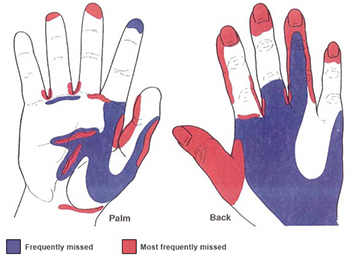Infection Prevention: Why It Matters in the Workplace
 Germs and bacteria that cause common illnesses are invisible to the naked eye. Whether you are in a workplace, public facility, leisure environment or educational facility, germs are spread from person-to-person and by touching everyday surfaces. In fact, according to a recent presentation by Dr. Charles Gerba, a microbiologist from the University of Arizona, “we share more common surfaces, or fomites, with more people than ever before in history.”
Germs and bacteria that cause common illnesses are invisible to the naked eye. Whether you are in a workplace, public facility, leisure environment or educational facility, germs are spread from person-to-person and by touching everyday surfaces. In fact, according to a recent presentation by Dr. Charles Gerba, a microbiologist from the University of Arizona, “we share more common surfaces, or fomites, with more people than ever before in history.”
Enclosed environments—like the workplace—where people are working or interacting in close proximity with one another are particularly at higher risk of the spread of germs. Poor hygiene will lead to increased illness and can result in disruption cost, lost productivity, reduced employee efficiency through illness at work and lower morale.
Skin Hygiene Facts
- Hands are the single most effective method of spreading germs, yet over half of all workers do not know the basics of hand washing
- At least 40 percent of workers do not wash their hands often, or long enough, to protect against the spread of germs
- Approximately 65 percent of maintenance and construction workers and 47 percent of office workers wash their hands less than five times a day
- The average hand washing duration is less than 10 seconds, missing vital areas where germs are commonly found (e.g. under fingernails and on the backs of hands)
Since our hands are responsible for the spread of 80% of common infectious diseases, effective hand hygiene continues to be universally recognized as the smartest, most cost effective means of infection control in the workplace—helping to minimize wasted time and resources and save organizations money all year round.
Ways to Improve At-Work Hand Hygiene
- Prepare in advance for the ‘flu season’ to minimize the impact of seasonal illness on the workforce and in turn, prevent any loss of service or outputs to customers or service users
- Encourage proper hand washing techniques by identifying commonly missed areas
- Communicate the proper length of time needed to wash hands effectively, which is for at least 20 seconds, according to the CDC
- Educate employees on the ‘dirtiest’ areas of the work environment—which according to Dr. Gerba include desks and unwashed coffee cups
- When a water supply is not available or when hand washing facilities are not conveniently located, hand sanitizers, such as Deb InstantFOAM®, can be used to complement normal hand washing
- Use the appropriate product—avoid cleansers that are too harsh, as they can make people less likely to wash their hands or even lead to skin conditions such as occupational dermatitis
In addition to the frequency and technique of hand washing, the format for how products are used is very important in the daily challenge of implementing effective skin care practices. Wall-mounted cartridge dispensing systems have long been recognized as the overall 'best practice' solution for delivering general skin care products. With a closed, one-time-use sealed system, there is no entrance of air during use, thus minimizing any risk of extrinsic microbial contamination. As a result, 'fresh' product is dispensed every time. In hygiene sensitive environments, such as healthcare and food sectors, this is of critical importance to help prevent the spread of germs causing infectious diseases and foodborne illness.
From as little as a few cents per day, each employee and visitor can have access to hand hygiene products in the workplace. Businesses already lose millions of working days every year due to employee sickness from seasonal influenza, so this low-cost investment is well worth it to significantly reduce the risk of germs being spread in the workplace. Numerous separate studies in a variety of different settings from around the world show that good hand hygiene practices can reduce illness, absence and associated cost on an average by around 40 percent.
Deb Group, the world’s leading away-from-home skin care company, has worked closely with organizations of all sizes and industries to implement hand hygiene products and systems to help prevent the spread of infection in the workplace. Deb’s line of sanitizing products provides effective skin disinfection after potential contamination with harmful germs. Further emphasizing the importance of infection control in the workplace, Deb has a dedicated website on this topic.
It can be easy for businesses to think of skin care as a trivial issue and a commodity buy, or for it to fall off their radar screens completely. However, encouraging proper hand hygiene through a structured skin care system helps to protect your employees’ health, as well as the operational health of your company.
Isabelle Faivre is vice president of marketing at Deb Group, the world’s leading away-from-home skin care company. She holds extensive away-from-home market experience and a Bachelor of Science in international marketing from McGill University and ESSCA, a French business school. At Deb Group, Faivre works with customers across a wide range of industries to provide innovative and market-leading skin care programs that improve employee health and safety and environmental impact while reducing costs. For more information on effective strategies for improving workplace hygiene, please visit
www.DebGroup.com.
Posted by Isabelle Faivre on Apr 29, 2014